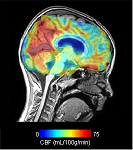Researchers at the Department of Neurosurgery recently received 25,000 euros from the Brain Technology Institute. With this amount, they hope to simplify diagnostic testing for children and parents.
Moyamoya is a condition in which a network of small blood vessels forms around narrowed arteries. That network is very vulnerable: it can cause brain infarcts. The capillaries can also burst easily, causing bleeding into the brain tissue. Usually this condition occurs in children up to ten years old and in adults between the ages of thirty and forty.
Treatment involves moving a healthy artery from outside the skull to a threatened area of the brain: an extracranial-intracranial bypass. The threatened area then receives sufficient blood again. To perform and prepare for such treatment, diagnostic testing is needed. Currently, that is a nuclear study in Amsterdam that requires an admission. Researcher Pieter Deckers will use this money to see if a specific MRI examination works as well as the nuclear examination. Deckers: ‘With this MRI examination, the neurosurgeon can determine whether an operation is necessary at that moment and where exactly he or she should operate. Importantly, this will hopefully allow diagnostics to proceed much faster and thus treatment. Thus, important brain areas are protected earlier in these often young children.
This examination does not use X-rays or inject radioactive substances and is therefore much less stressful for the patient, especially in children. Deckers: ‘Currently, an admission for observation is still necessary, but we want to investigate whether children can return home immediately after the examination.’
About 20 children have now undergone this MRI technique with good results.
This donation was made possible by Vrienden UMC Utrecht & WKZ.
